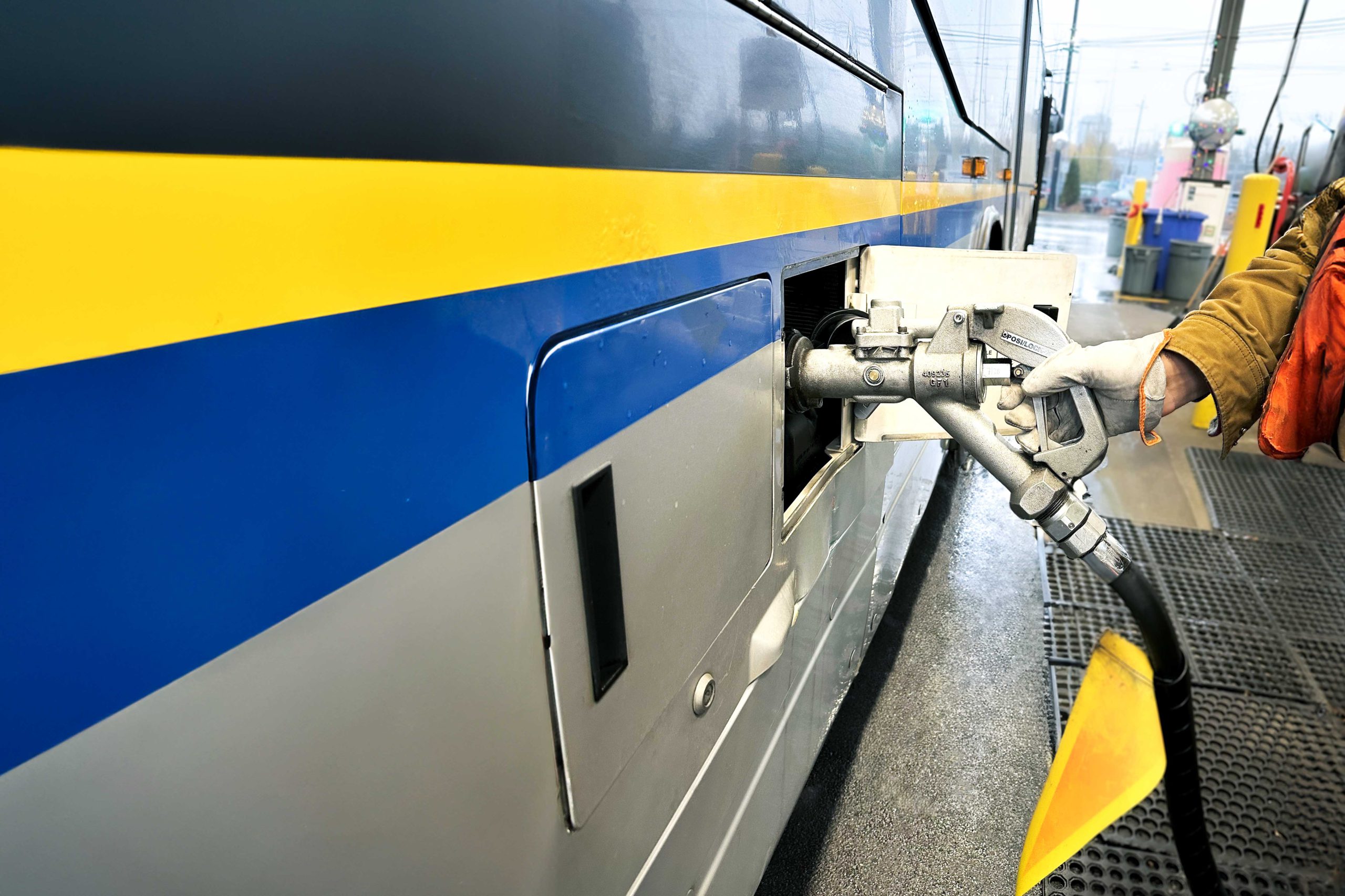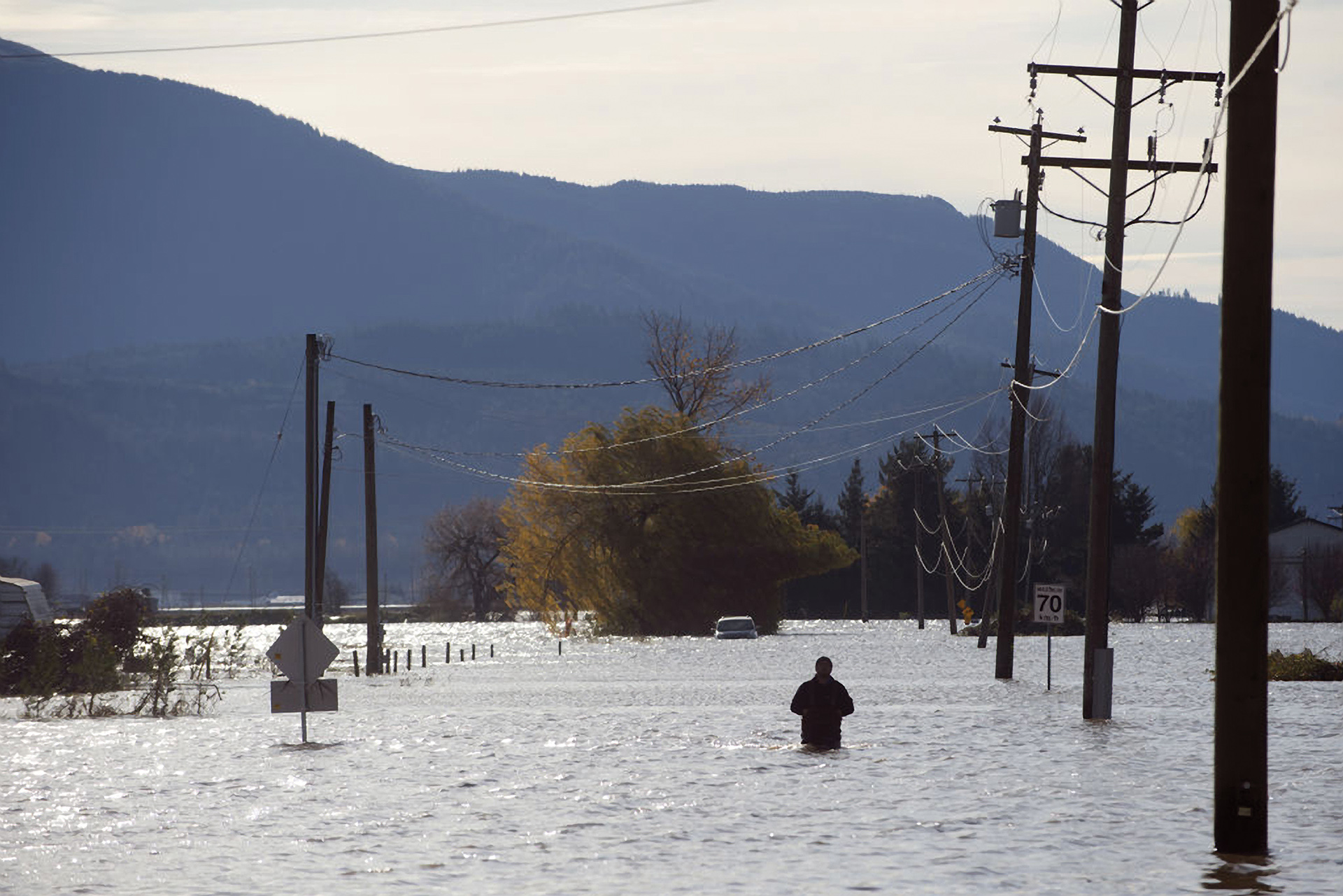TransLink shifts buses from fossil fuels to 100 per cent renewable diesel
TransLink shifts buses from fossil fuels to 100 per cent renewable diesel

What’s happening
TransLink is introducing renewable diesel into its bus fleet as a transition fuel while we electrify. Renewable diesel comes from organic waste, which includes used cooking oil and waste animal fats, as well as plant-based sources like vegetable oils.
As a low-carbon fuel, renewable diesel offers about an 80 per cent greenhouse gas (GHG) reduction compared to fossil fuel diesel across the whole life cycle — from production to tailpipe.
- As a first move, we’re shifting Surrey Transit Centre (home to about 90 buses) to 100 per cent renewable diesel effective Jan. 1, 2024.
- We’re planning on introducing renewable diesel to additional transit centres beginning in 2024.
- SeaBus and West Coast Express could even see renewable diesel in the future — something we’re studying.
By the numbers
- 64 per cent of TransLink’s total emissions come from diesel vehicles.
- Using renewable instead of fossil fuel diesel leads to an 80 per cent GHG reduction across the whole lifecycle — which includes both in production and consumption of fuel.
- We’re saving 6,550 tonnes of GHGs, which is 5 per cent of our total GHG emissions, by moving Surrey Transit Centre to renewable diesel. This is the same as taking 1,900 cars off the road!
Why it matters
The world and the region are facing a climate emergency!
Climate and extreme weather impacts are intensifying, bringing extreme heat, wildfires, and flooding — not to mention, disrupting the transportation and transit system in Metro Vancouver.
The biggest driver of climate change is the combustion of fossil fuels, which is something that we as the region and the world need to move away from.
In Metro Vancouver, road transportation is responsible for around 40 per cent of all GHGs — the largest single source of emissions. While TransLink is responsible for just one per cent of regional emissions, we’re taking action — because we all need to do our part.
Context
Through our Climate Action Strategy, we’ve set three ambitious targets to reduce emissions:
- 2050: Net-zero GHGs
- 2040: Zero-emissions fleet by 2040
- 2030: Reduce GHGs 45 per cent from 2010 levels
Thanks to our SkyTrain network and fleet of about 275 trolley-electric and five battery-electric buses, around 55 per cent of passenger kilometres travelled are zero-emission. With this foundation in place, we’re electrifying as fast as we can, including by building our first all-electric transit centre in Marpole in Vancouver. By 2030, we’re planning on having 460 battery-electric buses in service.
But electrifying transit takes time given the considerable amount of infrastructure and operational changes required.
How renewable diesel fits in
With our first climate target (cutting GHGs 45 per cent by 2030) only a few short years away, renewable diesel allows us to cut emissions from our diesel bus fleet immediately. That’s because renewable diesel is a drop-in fuel that doesn’t require changes to buses or facilities.
Given the scale of the climate emergency, getting rapid GHG reductions early is important, since every tonne of emissions contributes to worsening climate change.
While we’re still operating diesel buses — renewable diesel is a great option to help reduce GHGs.
A sustainable future
All energy sources have different trade-offs — including renewable diesel, which organic waste, which includes used cooking oil and waste animal fats, as well as plant-based sources like vegetable oils. Depending on how these different wastes and plants are produced, there could be potential land use or environmental impacts, such as the use non-organic pesticides or fertilizers. That’s why we’re working with our suppliers on supply chain transparency, sources, and to reduce the lifecycle emissions of the fuel we purchase.
This will ensure we take a balanced approach to transitioning our fleet to meet our 2030 climate goals.
Who is using renewable diesel?
Fleet operators around the continent — including BC Ferries, BC Transit, City of Vancouver, and Amtrak — are relying on renewable diesel to help reduce their greenhouse gas emissions.
Bottom line
Renewable diesel is an important transition fuel that will help TransLink rapidly reduce bus fleet GHGs while we electrify and move to a zero-emissions fleet by 2040.






